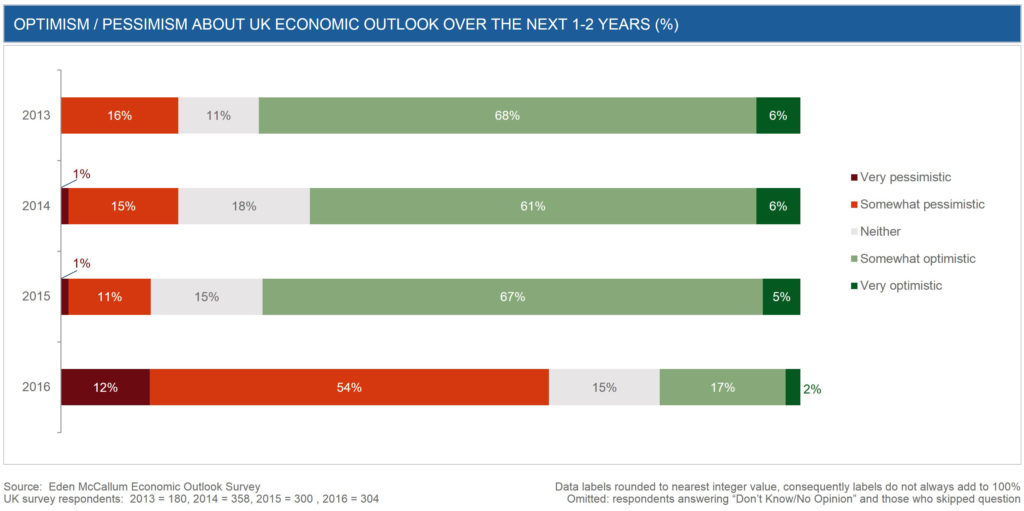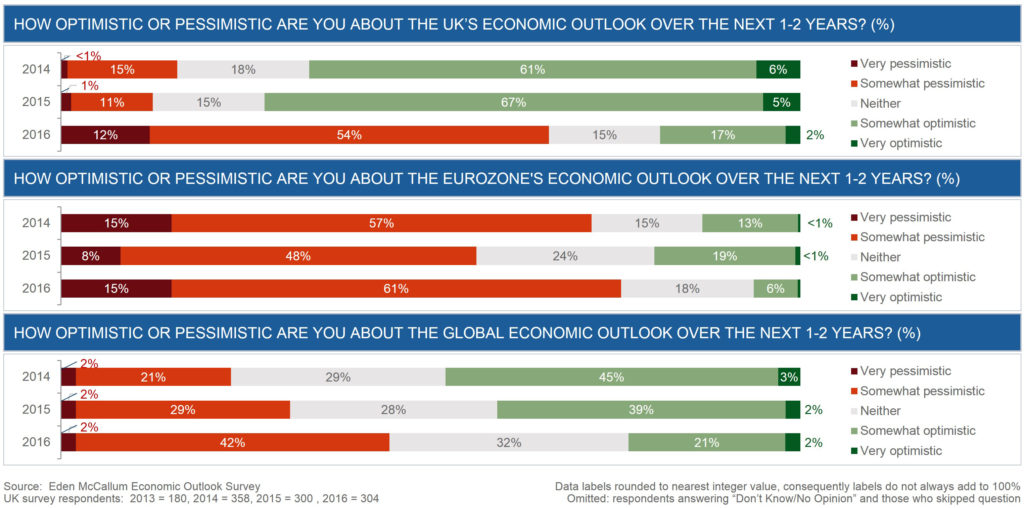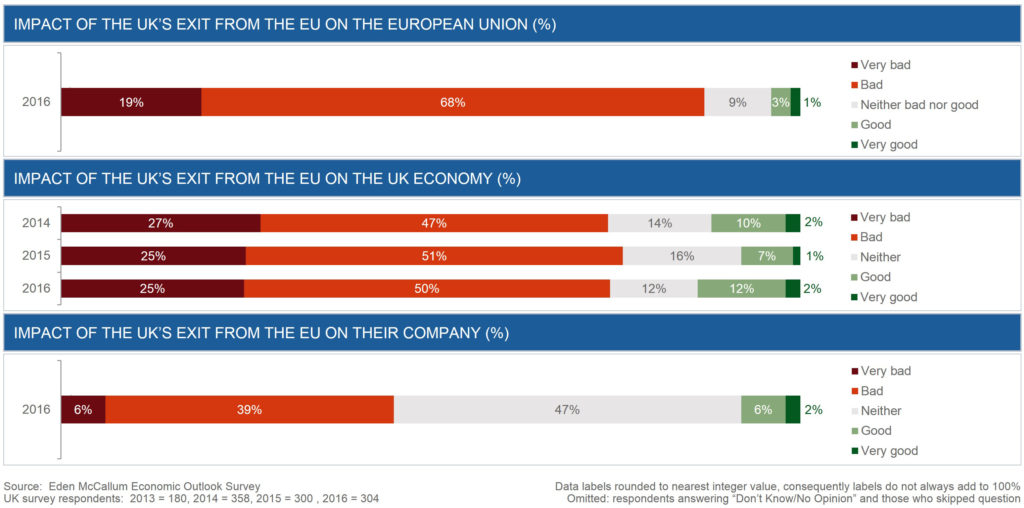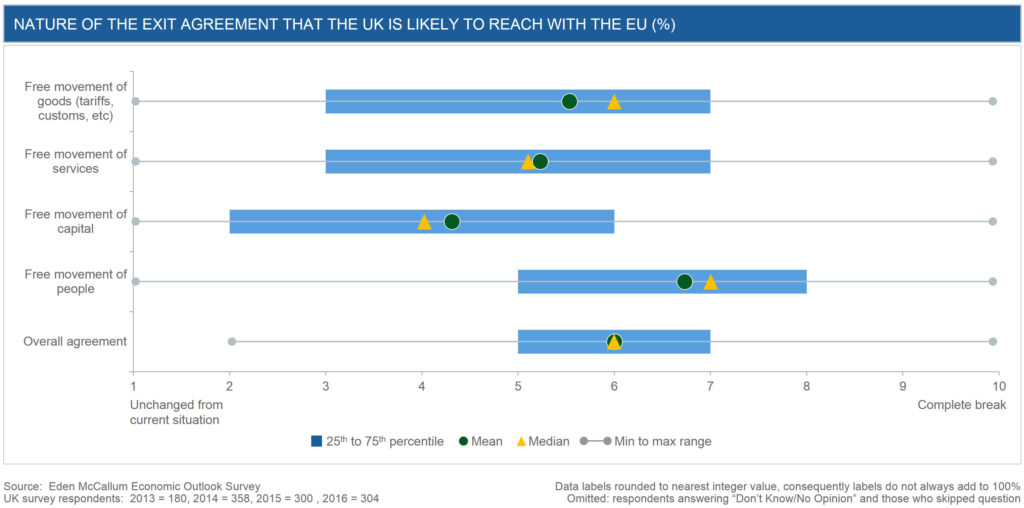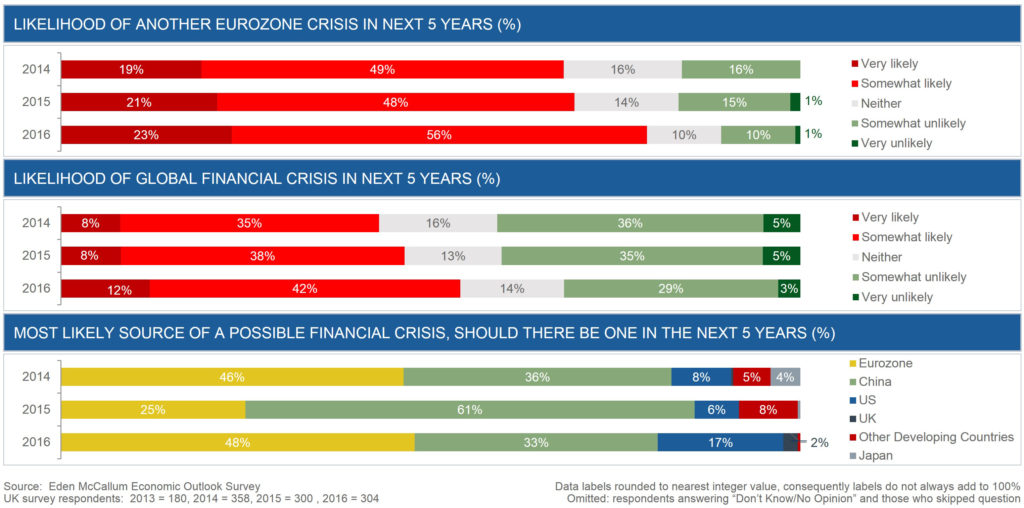Brexit chill hits British business – Results of Eden McCallum’s 2016 annual Economic Outlook Survey
66% are pessimistic about the UK’s economic outlook over the next 1-2 years
90% say it’s likely the UK will leave the European Union in the next five years
75% think the UK’s exit from the EU will be bad for the British economy
British businesses are feeling distinctly apprehensive about prospects for 2017 and 2018, according to the 304 UK business leaders surveyed by Eden McCallum at the end of November. In contrast to the optimism revealed in this annual survey in the past three years, the post-referendum research finds that gloom has set in over expectations for both the UK and Eurozone economies, while hopes for the global economy have also declined.
Our survey found that 66% are pessimistic about UK economic prospects for the next two years, a score that has leapt from only 16% in 2014 and 12% last year. In contrast to their British counterparts, Dutch business leaders are decidedly more optimistic about their country’s economic prospects: 80% were positive in our parallel survey carried out with 307 business leaders in the Netherlands.
This new-found negativity in the UK matches the downbeat attitude towards the Eurozone. Amongst our UK survey respondents, pessimism about Europe now stands at 76%, but was at 56% last year. These figures echo what pollsters Ipsos Mori recently reported – that Brexit has returned to the top of their “issues index”, the things which keep Britons awake at night.
Dena McCallum, co-founder of Eden McCallum, says: “These are pretty startling figures, in particular when compared with the results of our previous surveys. While some nervousness about the future might be understandable, our findings point to profound unease about the possible economic consequences of Brexit. And that from the people who will be making decisions about investments and hiring.”
Other details to emerge from this year’s survey include:
45% of business leaders think that the UK’s departure from the EU will be damaging for their companies. Only 8% think it could be beneficial.
75% of UK business leaders think that the UK’s departure from the EU will be bad for the country. Only 14% think it will be beneficial. 87% think that the UK’s departure from the EU will harm Europe as well.
Interestingly, in a parallel Eden McCallum survey carried out in Switzerland, 20% of Swiss business leaders surveyed thought Brexit might have a positive impact on their country.
One Swiss respondent commented: “I believe Brexit could be good for Switzerland, since this opens up opportunities for flexible bilateral (or multilateral) agreements that could replace EU frameworks.”
Returning now to the UK data, leaving the EU sometime in the next five years is seen as a near certainty: 90% believe it will happen. 73% think one or more additional countries might leave the EU in the next five years also.
Of the “four freedoms” of the EU’s single market, survey respondents in the UK said that freedom of movement was likely to be the most affected by a new agreement with the EU, with freedom for capital the least. Overall, business leaders in all three countries are expecting the agreement reached between the EU and UK to be marginally towards the ‘hard Brexit’ end of the spectrum.
Turning to the global economy and potential financial crises, 44% of UK respondents are pessimistic about prospects for the global economy, up from 31% last year and 23% in 2014. 79% believe there could be another financial crisis in the Eurozone in the next five years, up from 69% last year and 68% in 2014, and 54% believe there could be a global financial crisis in the next five years, up from 46% last year and 43% in 2014.
The most likely source of an international crisis is expected to be the Eurozone (according to 48% of businesses), while 33% point to China as the biggest source of risk, and 17% say the US. In contrast, last year 61% thought China was the most likely source.
Lastly, 70% thought the election of Donald Trump would be bad for the global economy.
Dena McCallum concludes: “The shock of the EU referendum is still being felt, as business leaders try to process the implications. It is a matter of concern that businesses are telling us they have severe worries about the future. The challenge to EU leaders and the British prime minister is to provide some reassurance and certainty to business before too long.”
Ends
Eden McCallum’s Economic Outlook Survey
Eden McCallum’s survey was conducted online with our clients and other business leaders. Responses were gathered between 16th and 30th November 2016 (after the US election and before the Italian referendum), and at the same time of year in 2013 (UK only), 2014 (UK and NL) and 2015 (UK and NL).
In 2016, there were 304 respondents to the UK survey. 84% of respondents were Chairs, CEOs/MDs, Board Directors, divisional Directors, or VP/Partners, within publicly-listed companies (40% of respondents), privately-held companies (49%), and other types of organisation (11%).
307 business leaders responded to our 2016 Netherlands survey. 77% of respondents were Chairs, CEOs/MDs, Board Directors, divisional Directors, or VP/Partners, within publicly-listed companies (36% of respondents), privately-held companies (52%), state-owned entities and other types of organisation (12%).
In addition, there were 57 respondents to the 2016 Swiss survey. 63% of respondents were Chairs, CEOs/MDs, Board Directors, divisional Directors, or VP/Partners, within publicly-listed companies (65% of respondents), privately-held companies (23%), state-owned entities and other types of organisation (12%).


